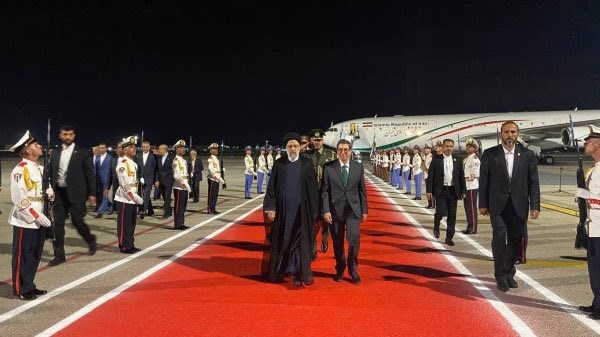President Raisi arrives in Cuba; last stop in Latin America tour
Iranian President Ebrahim Raisi arrives in Cuba as he heads a delegation that is set to meet with Cuban President Miguel Díaz-Canel, among other figures.
-

Iranian President Ebrahim Raisi was received by the Cuban Foreign Minister while arriving in Cuba on June 14, 2023 (Twitter/@IraninCuba)
Iranian President Ebrahim Raisi has arrived in Cuba, the last destination of his three-day tour in Latin America.
The delegation was received by members of the Cuban government, including Cuban Foreign Minister Bruno Rodriguez. The Iranian team is set to meet with the President of Cuba Miguel Díaz-Canel.
The Cuban Foreign Ministry said Raisi will meet with Cuban authorities and "carry out other activities of interest."
Foreign Minister Bruno Eduardo Rodríguez Parrilla of Cuba said in a tweet that Raisi's arrival in Havana was delayed, stressing the official welcoming ceremonies scheduled for last night have been postponed.
He also noted that the visit will allow the two countries to continue strengthening bilateral relations.
Dimos cordial bienvenida a #Cuba al presidente de la República Islámica de #Irán, Seyyed Ebrahim Raisi.
— Bruno Rodríguez P (@BrunoRguezP) June 15, 2023
Su visita oficial permitirá continuar estrechando las relaciones bilaterales, próximas a celebrar su 44 aniversario, y dinamizar los vínculos🇮🇷🇨🇺 en sectores de interés común. pic.twitter.com/uMBavuxVQZ
Earlier, the Iranian head of state landed at the Augusto C. Sadino International Airport in Managua, Nicaragua, as he led a delegation marking their second stop on the itinerary.
The delegation was received by members of the Nicaraguan government including Foreign Minister Denis Moncada. The Iranian team met with the President of Nicaragua Daniel Ortega and his Vice President Rosario Murillo.
Latin America contributed to the ongoing power transition in a world order
Addressing members of parliament in Nicaragua, Raisi highlighted that the persistence of independent countries in Latin America and elsewhere has contributed to the ongoing power transition in the world order and the free fall of the United States.
"The domineering powers want to force their selfish interests on the nations, and that's why we should question why America and some Western countries, who pretend to care about human rights, freedom, and democracy, don't respect the real votes of the nations in Palestine, Lebanon, Afghanistan, Iraq, Syria and Latin America," he said.
Previously, imperialist powers imposed their will on other nations using their armies or agents; today, they utilize sanctions to do it, the Iranian leader emphasized.
He added that "military occupation, coup, and sanctions" are the tools used by regimes against independent nations, stressing that "the US and Western countries claim to fight terrorism verbally, but in reality, as they admitted during the US presidential election, they created and supported the Daesh terrorist group."
Elsewhere in his remarks, he mentioned that the US has committed a crime in assassinating Qassem Soleimani who he described as a counter-terrorist hero, assuring that the world rebuffs Washington's false claims of combating terrorism.
"The current world order is changing and the indicators show that the authority of domineering power and the US is declining and the will of the nations in Latin America and West Asia is rising," he said.
"Imperialism tries to affect the influential groups of nations, and the duty of the elites of free societies is to prevent this," the Iranian leader stressed.
He emphasized Iran's policy of fostering relations with independent nations, pointing out that there are numerous opportunities for fostering ties between Latin American nations, particularly Nicaragua and Iran, and that the Islamic Republic of Iran is completely prepared to exchange knowledge and resources with Nicaragua.
Raisi also highlighted the necessity of continued communication between independent nations in order to safeguard them from imperialist plots and schemes.
He said respect for the will and vote of the people, as well as a shared history of resistance, exist between Iran and Nicaragua.
In their first stop, the Iranian delegation signed 25 agreements in Caracas, Venezuela, on cooperation and investment in petroleum and petrochemistry, as well as mining metallurgy and the creation of a joint shipping company.
The Iranian President previously described Tehran's relationship with the three Latin American nations he is visiting as strategic, highlighting their opposition to an international system based on "unilateral hegemonic power."
"Our common position with these three countries is opposition to the [world’s] hegemonic system and unilateralism," he indicated, adding that Iran cooperates with those countries in numerous areas.
"Export of technical and engineering manpower is among our important cooperation areas," Raisi said, noting, "We also cooperate with Latin American countries in the fields of politics, energy, science and technology, medicine, and economy."
The Iranian President stressed that his tour is a pivotal point in developing Tehran’s ties with Venezuela, Nicaragua, and Cuba.
Iran has visited several nations in the recent period, aiming to strengthen bilateral ties and boost cooperation. On the same note, Iran enjoyed a recent rapprochement with both Saudi Arabia and Egypt after a period of strained ties.
After being invited to the BRICS summit, Iran's Foreign Minister told his South African counterpart that Tehran wishes to expand ties with South Africa in a recent meeting in Cape Town earlier this month.

 5 Min Read
5 Min Read










